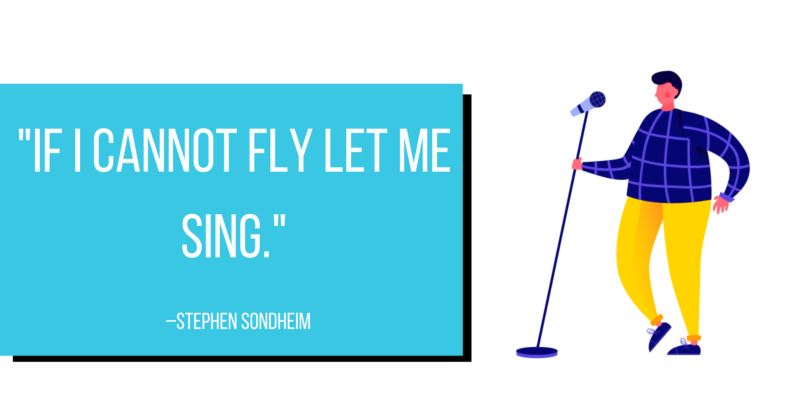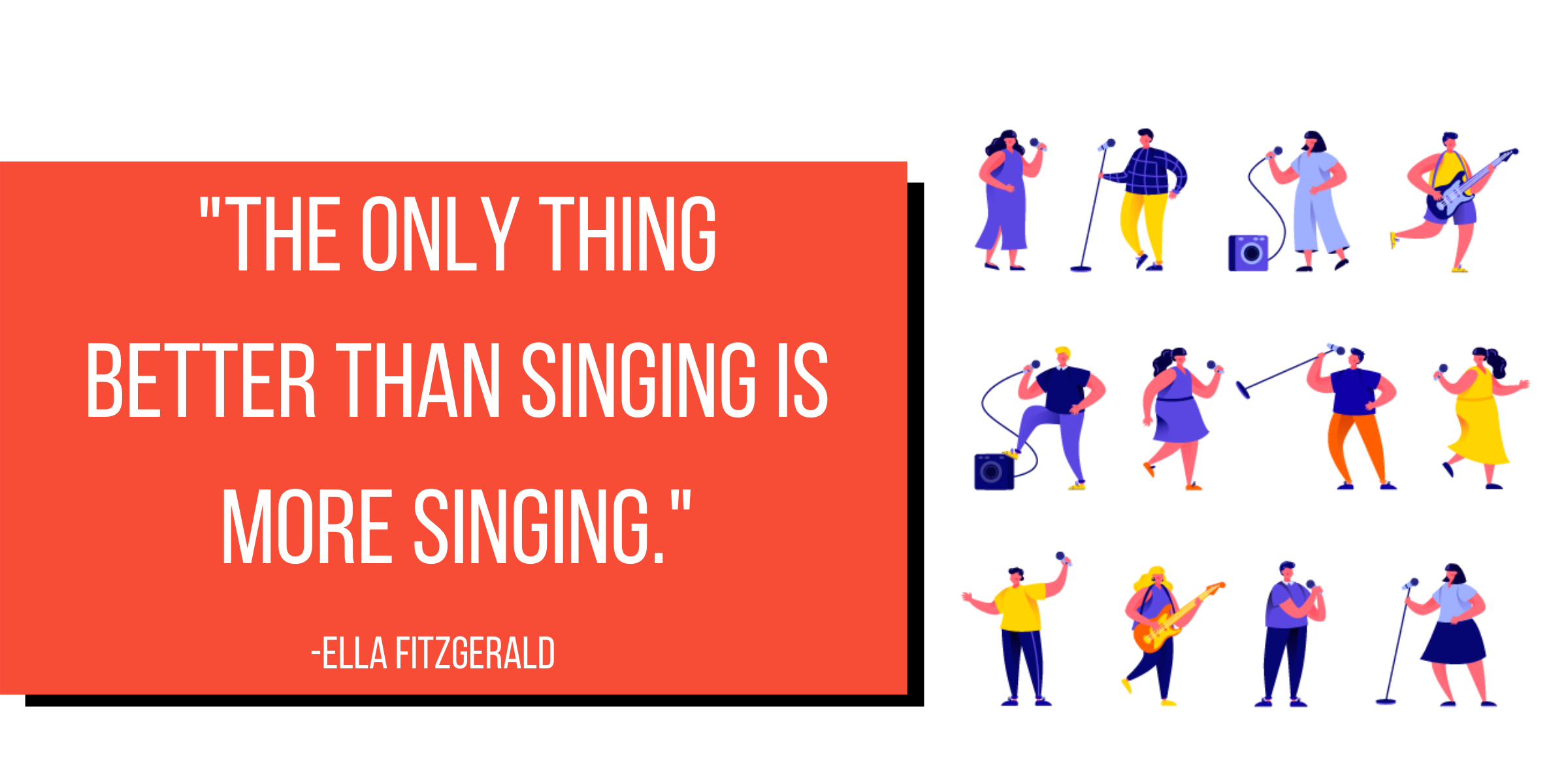It’s hardly an exaggeration to say that everyone loves singing. Singing is the most popular participatory art form in the US, with about 28.5 million people regularly singing in 250,000 choruses. If you’re not already a member of one, you may enjoy singing at karaoke, which is so wildly popular that the global karaoke industry is work over $10 billion. Even watching others sing is fun, whether it’s a live concert, music fest, musical theater, or a show like The Masker Singer, The X Factor, or The Voice.

For some people, the love of singing goes deeper, and they may want to fine-tune their vocal instrument with serious training. There are many reasons to learn to sing, of course. For some people, just learning to carry a tune and impress their karaoke friends is a worthy goal. Other people want to perform in a singing group, such as a choral ensemble or musical theater troupe, to develop a solo act, or to sing in a band. Whatever your musical ambitions are, there are several tried-and-true methods to achieve them. These ways to learn to sing range from free, fast, and simple, to costly, long, and challenging. There’s no right or wrong way to learn to sing, but thoroughly understanding your options will help you determine which method fits you best.
Reasons for Learning to Sing
If you’re naturally musical, the question “why Sing?” may be difficult to answer. For some people, making music is as natural- and as essential- as breathing. But many other people take up singing as a new hobby, to explore their creative side, to express themselves, or to expand their horizons. If you’re considering learning to play a musical instrument, there are many reasons to do so, and benefits to sticking with it, even when learning to play becomes challenging. Knowing the many benefits of learning to Sing can keep you motivated and help you appreciate your progress.
Singing helps prevent illness
Research conducted at the Goethe University in Frankfurt found that after singing in an amateur choir, subjects had significantly higher levels of antibodies in their bloodstreams, meaning their immune systems were strengthened.
Singing improves fitness
You don’t have to be performing arena rock to get a workout from singing. An article in the New York Times reported that opera singers have been shown to have better heart function and lung capacity than the average person. And the Telegraph reports that singing is an aerobic activity that increases blood oxygen levels.
Singing boosts your mood
A 2008 study conducted in Australia found that singers reported a higher level of personal life satisfaction higher than the average person did, even when their individual stressors were above the national average. Another study in 1998 found that residents of a nursing home who took part in a regular singing program for just one month had lower levels of depression and anxiety.
Singing improves your social life
To sing well, you’ll need to develop self-awareness, focus, and patience as you practice on your own. All these qualities help you be a better coworker, partner, and friend. When singing in a group, you’ll literally be in harmony with your peers, being attentive and responsive. And bonds are powerfully strengthened through sharing a positive and creative experience like singing.
Singing improves your sleep
Snoring and sleep apnea are associated with sleep loss, fatigue, weight gain, and even heart problems. But if you sound good singing, you probably sound good sleeping; experts say that singing strengthens the muscles of the throat and palate, which prevents snoring. You can also expect your posture to improve as your neck and back muscles grow stronger through singing.
Singing makes you confident
Just a few rounds of karaoke can make anyone feel like a rock star. When you learn to sing well through training and practice, your confidence grows dramatically. You’ll also develop a more resonant, clear voice and upright posture that will nonverbally communicate self-assurance in every area of your life. And although singing in front of others can be incredibly intimidating, most people also say that it’s exhilarating and makes them feel extremely confident.
Learning to Sing through Self-Teaching
If you’re motivated and passionate, you can absolutely be your own music teacher. Plenty of legendary singers, from Johnny Cash to David Bowie, were entirely self-taught. When you teach yourself to sing, you can go at your own pace, vocalize in the privacy of your own home, and
The methods that people use to improve their voices and singing haven’t changed much over the years. That means just learning these longstanding principles and applying them through dedicated practice can go a long way towards making you a better singer.
- Instructional Video Channels on YouTube such as Singing Success
- Guide Books such as “The Art of Singing: Discovering and Developing Your True Voice” by Jennifer Hammady
- Instructional Websites such as How to Learn to Sing in 14 Steps on WikiHow
- Recorded Lessons on sites such as Lynda
Needless to say, self-teaching is the most cost-effective way to learn to sing. Youtube and internet guides are free, and many books on how to sing are available for free through libraries.
Self-learning Pros:
- low cost or free
- go at your own pace
- private and convenient
Self-learning Cons:
- no technique modeling
- no personal feedback
- hard to maintain motivation
Learning to Sing through Online Classes
If you’re like most people, it’s easy to start a new undertaking like learning to sing, but hard to stick with it, especially once the novelty has worn off. If you find that your YouTube channel subscription is going unwatched and your instructional books are gathering dust, you may want to try online classes to learn to sing. Signing up for a class will give you more guidance than self-instruction, but will still generally allow you to learn on your own time and at your own pace, and from your own home. Most online classes in learning to sing are accessible and affordable as well.
Some of the most popular online classes for learning to sing are:
- Superior Singing Method
- Approach vocal training method
- Singorama
Learning to sing through a series of online lessons provides structure and instructor demonstrations, but one thing you’ll miss out on is feedback. Anyone who’s heard their own voice recorded knows that it’s hard to judge the way your own voice sounds (thanks to the way resonance work inside our heads). If you want someone to not just show you how to sing but listen to you and give you pointers, you’ll want private lessons.
Online Class Pros:
- some structure
- guided instruction
- demonstrations and modeling
Online Class Cons:
- usually some cost
- lower flexibility
- no responsive feedback
Learning to Sing through Private Lessons
Even a few lessons with a private instructor can go a long way towards helping you learn to sing your best. In a one-on-one session, you can learn through not only modeling and demonstration but through feedback and personal coaching based on your performance. There are actually two kinds of professionals people hire when learning to sing: voice teachers and voice coaches
Voice teachers, also called vocal teachers or singing teachers, work on a student’s vocal techniques. Sessions focus on training pupils in physical skills like range, note accuracy, singing posture, breath control, head voice vs. chest voice. They also help students learn to maintain their vocal health so that they can sustain their song performance.
Voice coaches, also called vocal coaches, work on a student’s song performance. They usually play along on a piano while guiding singers through learning and rehearsing songs. Along with building their repertoire, voice coaches help students with their stage presence and showmanship so that they can be great performers as well as great singers.
- Freelance voice teachers and voice coaches
- Singing lessons within music class franchises like School of Rock
- A College of Music or Conservatory
Finding the right person to help you learn to sing this way is essential- you’ll want to learn from someone who has singing skills, experience, and a teaching style that fits your learning style. Because you’ll be working so closely with your voice teacher and/or voice coach (potentially for years), it’s worth taking your time to seek out someone you enjoy working with.
Private Lessons Pros:
- intensive feedback
- personalized and structured
- easier to stay motivated
Private Lessons Cons:
- high cost
- must be in-person
- personal fit is important
Learning to Sing through Degree Programs
If singing is your life, and you see yourself going for a future in the performing arts, you’ll want to consider getting a degree in singing. A degree in singing usually comes in the form of a degree in music with a concentration in vocal performance. There are two main types of music degrees: BAs and BFAs.
A Bachelor of Fine Arts or Bachelor of Music (BFA or BM) has a curriculum that’s solely devoted to music, without general education classes. A BFA is a great choice for people pursuing a career in the performing arts.
A Bachelor of Arts in Music (BA) is a liberal arts degree, which means its curriculum is made up of about one-half general education core classes. A BA is a good choice for those who would like a broader range of career options, usually in the music industry, since a BA can lead to jobs in administration, marketing, or advocacy.
In a music degree program with a vocal performance concentration, you can expect to take classes in:
- music theory
- music history
- vocal styles
- sight-singing
- ensemble performance
- aural comprehension
Studying at a college, university, or conservatory is a major investment. You can expect to spend several years and thousands of dollars pursuing a degree in vocal performance. At the end of your program, you’ll need to have skill, luck, perseverance, and flexibility to find opportunities in your field. Making the most of your school’s internship and mentoring programs and your alumni network can help you make the most of your skills and interest in singing.
Music Degree Pros:
- learn singing history, theory, and technique
- high structure and feedback
- training, mentoring, networking
Music Degree Cons:
- highest cost
- must apply and audition to get in
- fine arts degrees don’t always lead to jobs

Further Reading:
- What Can I Do with a Performing Arts Degree?
- What Can I Do With a Degree in Music?
- 10 Creative Careers That Won’t Require You to Be a Starving Artist
- The 20 Best Jobs Without a 9-to-5 Work Schedule
- 15 Degrees That Are Perfect for Becoming Your Own Boss
- Top 10 Careers for Extroverts
- Are There 2-Year Degrees in Music Therapy? Are They Worth Getting?
- Should I Get a Master’s Degree in Music Therapy?
- Do You Need Clinical Experience to Become a Music Therapist?
- What Are Some Other Careers Related to Music Therapy?
- What Can I Do With a Bachelor’s Degree in Music Therapy?
- What Are the Differences Between Art Therapy and Music Therapy Degrees?
- What Certifications Do You Need to Become a Music Therapist?
